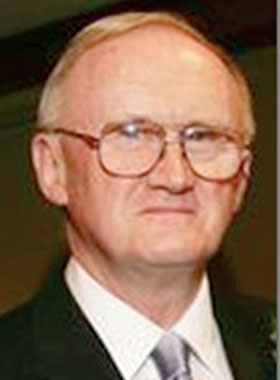
Ken Duckworth, retired Professor of Geophysics at the University of Calgary, died peacefully on the evening of February 18, 2018 at the Foothills Hospital.
He was born in the small town of Barnoldswick in Lancashire, England and moved to Calgary, Alberta, Canada in 1968 to teach at the University of Calgary. He is survived by Robyn Hallet, of Didsbury, Alberta.
Remembering Ken
“I remember Dr. Kenneth Duckworth, both as a colleague at the University of Calgary and as a major contributor to the CSEG as an author of papers in the Canadian Journal of Exploration Geophysics. Ken obtained his university education in England, receiving a B.Sc. in physics in 1960 and a Ph.D. in applied geophysics in 1964 from Leeds University. After working with the Australian Bureau of Mineral Resources for 4 years, he came to Canada in 1968. In that year, Ken received an appointment as Assistant Professor at the University of Calgary. He was one of the first members of the Geophysics program at the University of Calgary who rose to the rank of Professor. Ken’s interests were in the use of electromagnetic (EM) prospecting systems in mineral exploration, and this was the area of his main contribution to the Canadian geophysics community. It seemed that Ken was always happiest when doing EM field experiments with the students, and in his research projects. This was where Ken had his best collaborations, and he was always keen to involve other geophysicists in EM prospecting.
He regularly came to the university on his bike, enjoyed coffee conversations with colleagues, and was dedicated to teaching electrical and electromagnetic theory. In 1994, Ken Duckworth won the CSEG Meritorious Service Award. There are few, if any, professors at our University who had Dr. Duckworth’s knowledge of mining geophysics and his presence will certainly be missed.”
Dr. Larry Lines Professor
Dept. of Geoscience
University of Calgary
“My fondest memories of my Dad are of us in the mountains every fall to see the Larches change color. Each year was a new display of brilliance, and never the same picture twice. We both agreed that J.R.R Tolkien should have based his ‘Golden Wood’ on the hidden larch forests of the Kananaskis.
Dad loved to hike, and spent most of his time exploring the Rockies. Always searching to find new valleys, lakes, hidden paths, and most of the time forging his own trails. He could recall every name of any mountain out there, and tell you the history of the commander, general or person it was named after.
His extensive knowledge of the landscape was a great value, especially when hiking the untraveled paths in remote areas. One of the great lessons he taught me was, ‘never go down anything you have not come up.’ Which meant, never descend a mountainside or slope that you have not previously climbed up. ‘Lacking the knowledge of the terrain below you’, he explained, ‘can get you into a world of trouble… especially when trying to get down off a mountain in bad weather’. His vast experience and exploration of hiking the Rocky Mountains was always impressive to me.
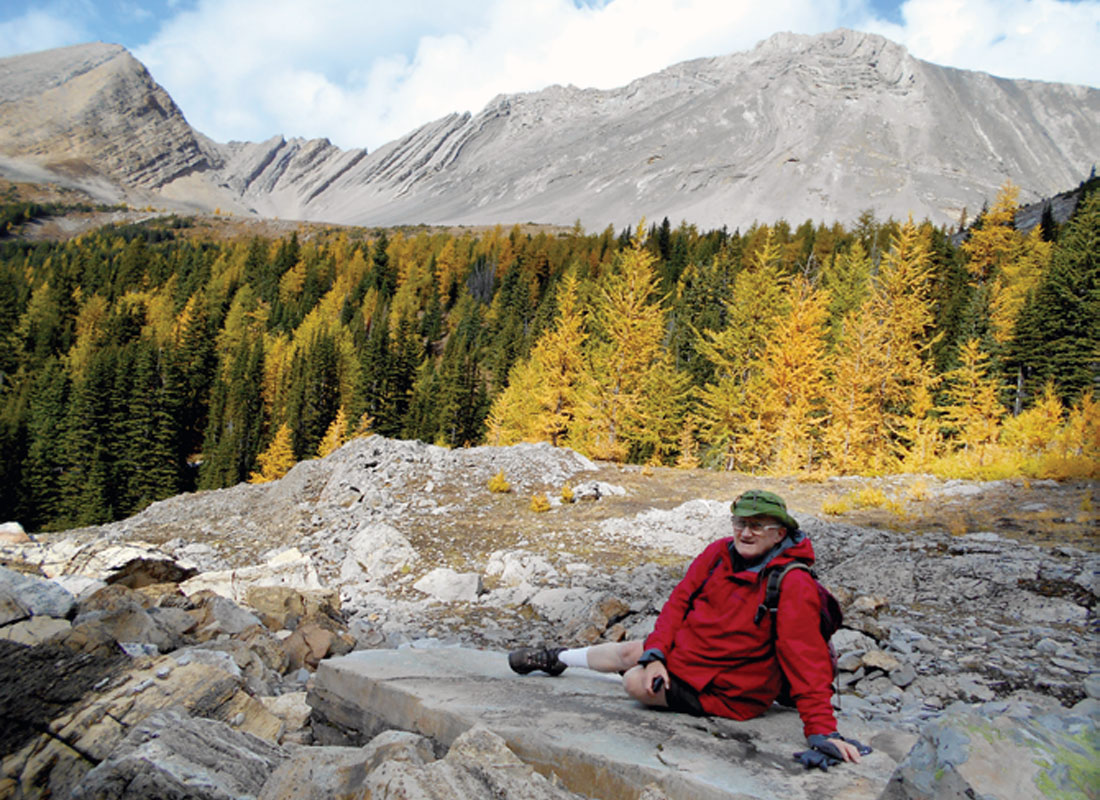
Dad always knew the most scenic places to take pictures from, even if it involved hiking a scree slope for hours when all the other hikers took the trails. He saw and shared some amazing views.
We were fortunate enough on one particular hike, to witness a stream start up and pour down over the rocks in beautiful cascading waterfalls. The stream bed had been dry as a bone just the minute before, until we sat down for lunch. It seemed that it started up just for us. Something he was very tickled about.
He was truly a grand adventurer. I will miss our hikes together.”
Robyn Hallet,
Daughter
A Tribute
Dr. Duckworth was incredibly clever, accomplished, witty, cultured, well-traveled, experienced, well-read, disciplined and generous. At times he was inflexible, but deep down he was a caring individual. Rather than attempt to recount his entire life in a page or two, below you will find a collection of the various encounters, experiences, memories and stories written by those who were fortunate enough to get to know him.
“Dr. Duckworth was my friend, a sounding board and an important influence in my development as a person and geophysicist.
My earliest memory of Dr. Duckworth was from undergraduate studies, where he taught Mining Geophysics. His reputation for being a tough professor preceded him. Many of us attended class in fear of Ken, only to later find that terrifying us was just a tactic to weed out any student who did not belong.
One of my favorite geophysics reports was done in his class and it was on uranium exploration. His engagement in my learning process, availability to answer my questions and extensive knowledge in the subject matter invigorated my desire to be a geophysicist.
I was a student-athlete during undergrad and had learned that Ken attended some of my volleyball matches. I never imagined that a professor of mine would ever be impressed by my athletic ability or have the time to attend my sporting events. He seemed so hard to please and too occupied with research, publishing papers and preparing teaching material for lectures. But, later when he expressed to me how difficult the sport looked, applauded my dedication to it and relentless pursuit of the ball, by ‘throwing my body on the floor’ before ever allowing it to hit the ground, I realized that I had earned his respect. The exchanges he and I would have on the topic of volleyball and geophysical exploration was the start of a bond that later formed into an unexpected friendship.
Throughout Ken’s retirement, we would meet for breakfast about every two months to catch up on one another’s lives. We had conversations about the recent hikes he had been on, his encounters with wildlife and the anomalies he would find whilst conducting EM surveys in Kananaskis Country. We discussed the latest books he read, including the history of the Persian Empire, his theories on plate tectonics and quantum mechanics. He shared his passion for cars, especially for his 1962 Lotus Elite Type 14 and showed me pictures of himself in his slender youth while in Greece surveying the site of the battle of Mantinea and Mount Artemisium. He would provide his thoughts on current social issues (e.g. disagreed with how a Radon study was done in Calgary), economic matters (e.g. questioned why charities needed to exist), political topics (e.g. found humour in the continuous Trump tweets, especially the one declaring himself to be a “stable genius”) and environmental problems (e.g. his idea on how to solve the world’s energy crisis by extracting methane gas trapped in bubbles within frozen lakes), and the latest developments in science, for example, the ‘erroneous’ detection of gravity waves. Oh, and he was not afraid to share his love of the minions! Ken had a wealth of knowledge. I valued his advice, counsel and time. He offered them unselfishly, especially when I required it the most during my PhD studies.
In the last year of his life, it was hard for him to keep up to the pace he was used to. He started to send me daily emails to check in and let me know that he was still alive. In the last few months of his life, I would make frequent visits to the hospital and his home to socialize and help wherever possible. During his last days in the hospital, I even read him the first chapter of Stephen Hawking’s “A Brief History of Time”, and he corrected me several times on the pronunciation of scientists whose names appeared in the book. Despite his declining health, he remained tough and critical until the end; he even managed to maintain his British humor throughout it all, which somehow I grew to appreciate.”
Dr. Neda Boroumand
CSEG President Elect 2019
Friend and former student of Ken
“My strongest memories are of Ken coming over to MacEwan Hall at least once a week, after his retirement, to have breakfast or coffee and to connect with friends and former colleagues from his years at the university.
Conversations with Ken covered a wide variety of topics: earth science; cosmology; politics on both sides of the border; classical music performances; automotive and aeronautical technology, classic movies and acting performances.
Ken always had strong opinions about most topics, and never suffered fools to express an uninformed opinion unchallenged. He was always reading, most often a book on physics or cosmology, and he often strenuously questioned some of what he considered 'extreme' or fanciful explanations of phenomena observed in the universe... for example, inflation, dark matter, and dark energy, often offering alternative explanations. His views of politics and current affairs were always formed by a thorough knowledge of historical events, seemingly playing themselves out again in modern times due to mankind's inability to learn from previous experience. Ken enjoyed watching YouTube performances of classical music, particularly violin soloists and vocal soloists; and he and I often had spirited debates about the merits of the performance of particular artists. He also enjoyed drawing my attention to various bizarre bicycles and related devices that he found in his browsing.”
Dave Henley
Research Geophysicist, CREWES, University of Calgary
Friend of Ken
“I was a student of Ken’s and became reacquainted with him shortly before his retirement. We shared a common interest in motorcycles. I saw him almost every weekend for the last 10 years where we would meet up at a local motorcycle shop on Saturdays and spend the afternoon together.
His last couple of months were difficult, and I would wish for myself a speedier end, but we get what we get. No one gets out alive.”
Jim Wylie, P. Geoph.
Friend and former student of Ken
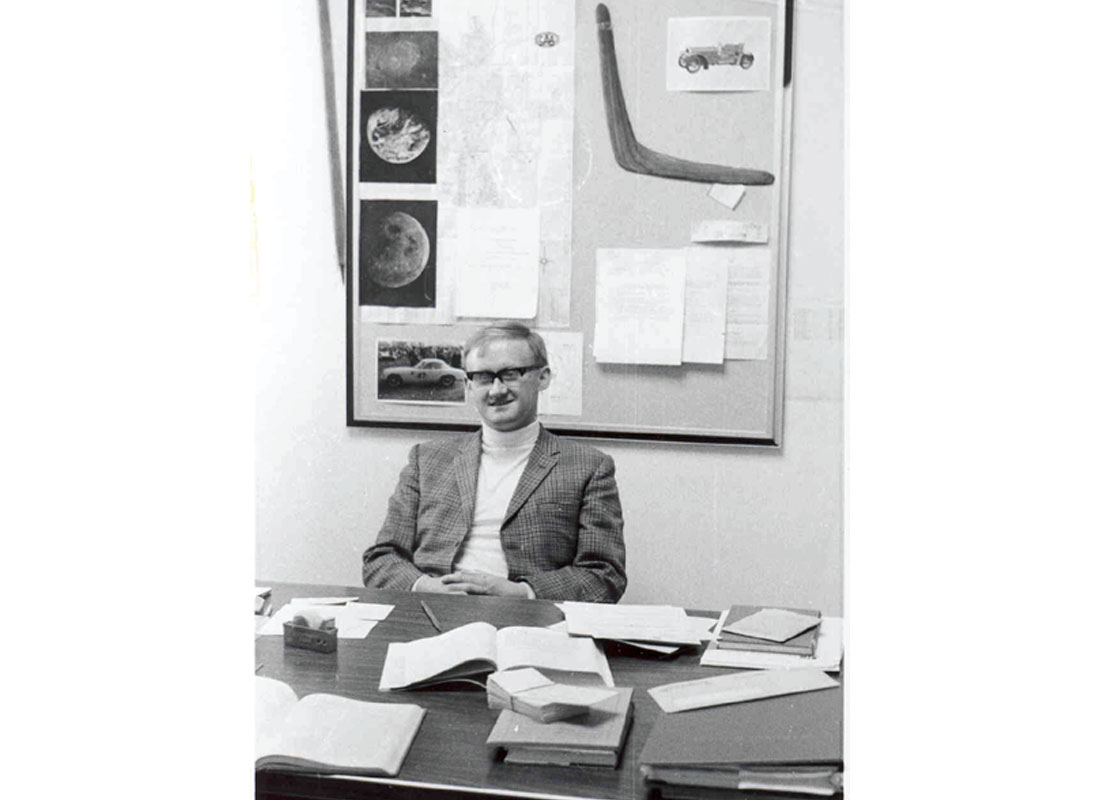
“I first met Ken Duckworth in the late summer of 1968 when he had just joined the faculty of the Geology Department. We immediately became long term friends. Over the past fifty years, I worked with him on the many Geophysics Field Schools in B.C., drilling for ore samples, surveying and doing field work in the foothills and the mountains. I also joined him on many hikes and cross-country skiing in the upper Elk Pass area in Kananaskis Country. After I retired, Ken frequently came out to Cochrane usually for coffee or dinner. Then, we would often talk into the late-night hours on the many topics that spanned the range from the ancient battle sites in Greece to his new theory on flight. The last words to us was his concern about our driving home safely from the hospital. Yes, he was a very considerate man. Sylvia and I will miss him and his unique brand of humour.”
David W. Harvey
Technical Officer
Geology and Geophysics Department 1963-1993
“In the 1990s Ken had me run a couple of geology field trips for Geophysics Field School in the Longview-Kananaskis areas to put the EM, GPR & seismic acquisition sites into perspective geologically. Since he always seemed serious on campus, I was surprised to hear a constant stream of humorous comments muttered under his breath, usually in response to what students in the backseats were saying about other professors and courses. I mentioned that I rarely use official hiking trails to access geology outcrops since every creek has game trails to follow and after that he would pop into my office to describe his latest hike, very excited to check out the corresponding geology maps.
In the 1980s I was at a conference in Leeds and ran into two guys who had gone to graduate school with Ken. They asked how he was doing and if he still wore navy pants, or shorts with knee socks, and a brown T-shirt (or turtleneck alternating with brown pants/shorts with a navy shirt. I’ve never seen him wear anything else before or since, though he’d add his plaid sport jacket for special occasions.”
Dr. Deborah Spratt Emeritus
Professor of Structural Geology
Former co-worker of Ken
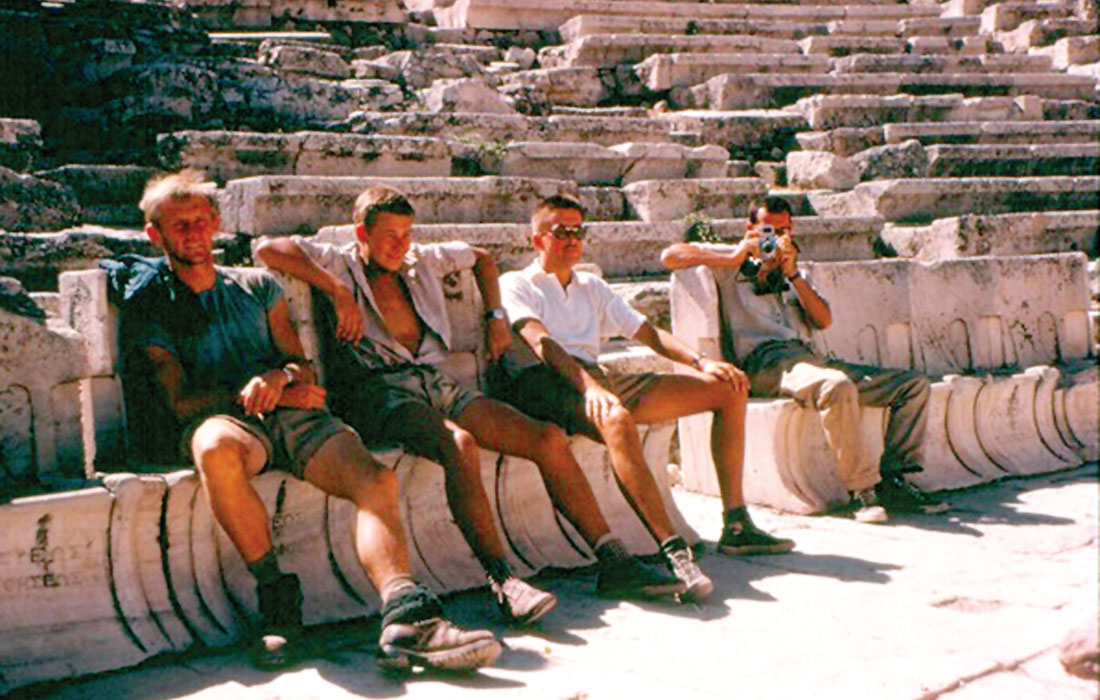
“I first met Ken Duckworth in 1979 when I immigrated to Canada to start a new job as an Assistant Professor in Geophysics at the University of Calgary. In fact, Ken kindly picked me up at the airport upon my arrival and shepherded me around for the next couple of days. At that time, the geophysics program at the UofC was just getting started and Ken was one of only three faculty members in geophysics, along with Peter Gretener and Tom Davis. As the geophysics program developed, Ken taught Mining Geophysics courses, focussing on electromagnetic and electrical exploration methods. Ken also taught these topics for several decades in the Geophysics Field School and took students and equipment to many remote sites in British Columbia, where there were ‘decent rocks’ for these geophysical methods to be demonstrated and applied.
Ken had a somewhat quirky personality, which some interpreted as gruff, and students sometimes feared approaching him for additional help in courses. However, those who did were rewarded by his sincere willingness to help and he would then spend as much time as necessary to answer all of their questions. Ken believed in high academic standards and maintained this consistently throughout his teaching career.
Ken’s many research contributions included both theoretical and practical aspects of electromagnetic surveys and in developing new instrumentation for these surveys. His invention of co-axial transmission and receiving electromagnetic coils was highly regarded. Ken acquired one of the first available superconducting magnetometers to allow more sensitive measurements of both electrical and electromagnetic fields to be made.
Off campus, Ken’s alter ego prevailed. He had a stable of high performance motorcycles and spent years restoring a rare vintage Lotus Elan sports car, while also bicycling to and from work each day under all and any of Calgary’s weather conditions. Ken was a good friend and I will miss him.”
Don Lawton
Director, Containment and Monitoring Institute
Friend and Former co-worker and Ken
“Ken certainly was a character. At one time he and I were both owners of vintage Lotus cars. Mine was rare, his was extremely rare. I had a number of coffee breaks with Ken and sometimes the conversation was odd, but always interesting.”
Dr. Ian Hutcheon
Professor Emeritus
Department of Geoscience, University of Calgary
“My lasting memory of Ken is that he refused to lower his grading standards, and insisted that the students needed to work harder as the material hadn’t changed!! Although, he wasn’t as polite in how he vocalized that!”
Dr. Rachel Newrick
Consultant Geophysicist
“For those of us who were fortunate to have known Dr. Duckworth, he will be missed, with his contribution to our lives cherished and remembered.”
Janelle Kaprowski
Geologist at SNC-Lavalin
Former student of Ken
“I got to know Ken after about 2007. I bought a classic motorbike from him and he gave me a very good price. Being familiar with the culture of Northern England I liked Ken and he was a good friend to me during some tough times and he introduced me to his motorcycle cronies. He later went through similar troubles and I wish now that I had taken more time to help him.”
Dr. Robert Ferguson
Associate Professor of Geophysics
University of Calgary
“For me, with all of the stories he told me, he was often a bitter man, but bitter because he saw so much injustice around him. He was such a loyal friend, so very loyal. He would recount stories to me about things that happened to his dear friend Sam Nelson, and even 30+ years later, he was still standing up for Sam!! I loved talking to Ken, he was always kind to me and an hour with him would go so quickly, but always his loyalty stood out so strongly.”
Laura Baird
Former Program Manager, CREWES Project
Friend and colleague of Ken
“Dr. Duckworth stood out as an individual with a particularly strong character, a unique individual who added colour to the department of Geology and Geophysics and encouraged thinking outside the box. I remember him calling proponents of the convective model of plate tectonics ‘porridge stirrers’.”
Alex Wright, P. Geoph.
President, Consultant
Rocky Mountain Resources Canada
“There are two things I remember about Dr. Duckworth: 1. He gave me an opportunity by giving me a D- on my final so I could get a C+ in the course; and 2. His brown trousers and blue t-shirts.”
Brian Schulte
CSEG RECORDER, Chief Editor
Former student of Ken
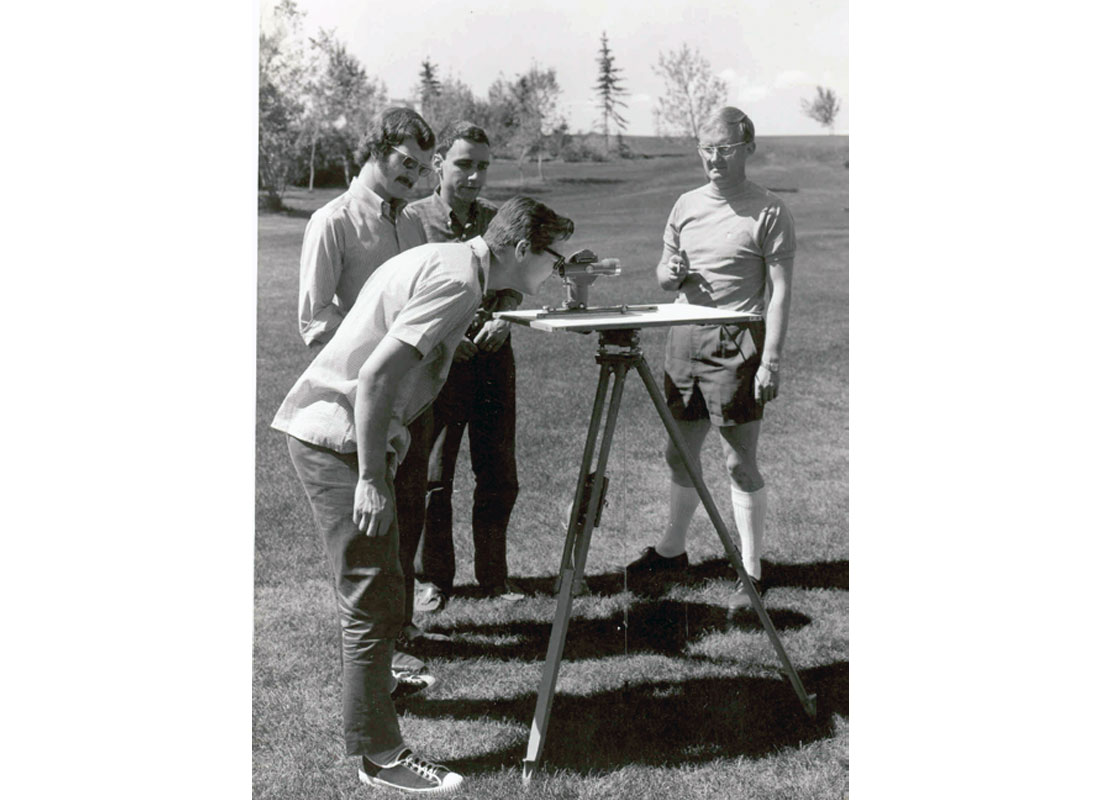
“I met Ken in 1980 when I first joined the University of Calgary as a geophysics professor. It was clear from the start that he was a sharp, witty and analytically-minded geophysics professor. We often discussed ideas from geophysics and other sciences, and he would often denounce the currently accepted explanations and ideas in various topics such as plate tectonics and cosmology and offer up alternative explanations that he felt would better fit the data. He would also often come up with daft ideas (his words) on new geophysical methods and various methods of energy extraction and on other scientific and technical topics. Ken and I also collaborated on geophysical research, publishing eight or nine peer-reviewed papers together on a new method of electromagnetic prospecting that he devised. He did the field work and I provided the mathematical theory explaining the data. I felt it was a fine collaboration in that neither of us could have done the work on our own – it was a good example in my mind of the usefulness of collaborative research. It was sad for me to watch his health drastically decline in the last few months of his life. But to his credit, he took it all in stride and tried to maintain a positive attitude. I will remember him always as a good friend and colleague."
Ed Krebes
Emeritus Professor of Geophysics
Department of Geoscience
University of Calgary
“My initial impression of Dr. Ken Duckworth was unforgiving – at various times I thought he was a British prig, a tough guy, a free radical, and even an old grump! To be clear, our earliest interactions began with him telling me directly that he didn’t want to smell any perfume from me in his class because he was allergic. I agreed, but then replied that I didn’t want to smell any cologne from him in his class because I was allergic. He smiled quite genuinely and I knew from that day forward that we had a mutual respect for one another. I was a mature student, a mother of three small children actually, and he challenged my decision to attend university when I “should be at home with my children”. However, after regular visits to his office (with my kids in tow) he saw that his class was important to me and that I took my education seriously. Over time, we were able to connect and enjoy each other’s company and I learned just how much he cared about his students, despite his hard exterior.
As many people know, Ken did not pull punches. This was the main reason why he became one of my most trusted confidants and advisors in all things scientific. It didn’t matter what topic I threw at him, he always dug into the history and current understanding of it and was able to help guide me through my ability to unpack concepts. He was fearless in is exploration and steadfast with his opinions and I have always secretly hoped that some of that confidence rubbed off on me.
Our discussions were often absurd and sometimes serious. Over soft serve ice cream, he explained naval battle strategies and the best mountain hikes and fishing holes in Banff National Park. At my dinner table, he lectured my children about which universities to go to and sure-fire ways to get good grades. And, at his kitchen table we imagined several ways to harness the potential energy of all the toilets flushed in the city of Calgary. My favorite moments ended with him chuckling quietly over his own cleverness and saying, “Well, anyway…” as he leaned back in his chair.
Watching his decline was difficult, but not nearly as difficult as it was for him to say goodbye; he didn’t want to die. But, with his strength of character he would wipe sadness from his face and say, ‘I’m British and so must have a stiff upper lip.’ For me, Ken will be remembered as a gentle man with a sharp mind (and sometimes tongue), a quick wit and an incredible talent for creative thinking and writing. I’ve read his stories and poems to my own children and hope to read them to my grandchildren someday. His memory will linger in these imaginative works, in the halls of the university and in the minds of all his former students. RIP Ken.”
Amanda Hall, P. Geoph
Area Geophysicist at Canadian Natural Resources Limited
Friend and former student of Ken
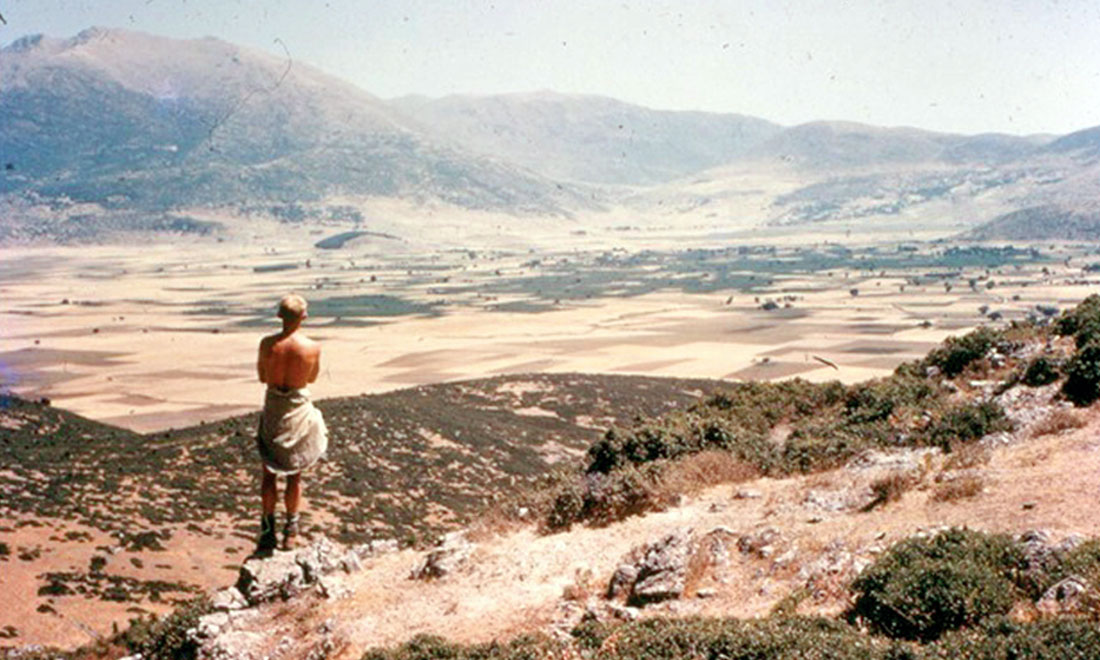











Join the Conversation
Interested in starting, or contributing to a conversation about an article or issue of the RECORDER? Join our CSEG LinkedIn Group.
Share This Article